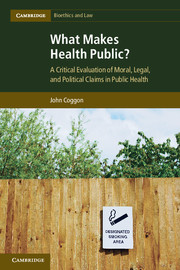 What Makes Health Public?
What Makes Health Public? Part III - Tackling responsibility: liberal citizens as subjects and sovereigns
Published online by Cambridge University Press: 05 June 2012
Summary
Introduction to Part III
In Part III I present and defend an approach to developing and understanding the scope of political liberalism. My aims here, as in the rest of the book, carry two prominent themes: first to demonstrate a ‘methodological approach’; second to offer my own views on what I take to be the best applicable approach to normative analysis. This means that even where my conclusions are not accepted, I hope to raise provocative and useful ideas for alternative, contradictory theories. This ‘building’ of a theory is the work of Chapter 10, which exposes the nature of us as concepts in politics and under the law, and the consequent normative implications. Chapter 11 then takes this theory, and through discussion of its bearing on various substantive questions presents it in relation to public health law and ethics. Necessarily, given all that has come in the previous sections, it is not a theory ‘of’ public health law and ethics. Rather, it is a political theory that can be applied to public health issues. Equally, and again of necessity, it can be applied to all other manner of questions facing a political society. Such a theory is demanded prior to study in public health law and ethics. An interesting observation, then, is that this book began with the specific, and through its deconstruction and analysis has worked out to the general. It should by now be clear why this is the case, and why final positions on questions in public health law and ethics – Should the wearing of seatbelts be enforced at law?; Should smoking be banned in public places?; Should the drug ecstasy be decriminalised? – require the manner of inquiry outlined here as a start point. To gain meaningful answers to questions of what makes health public, we need to look to political framing, not, for example, to norms that seem to emanate from the various ‘faces’ of public health presented in Chapter 3.
- Type
- Chapter
- Information
- What Makes Health Public?A Critical Evaluation of Moral, Legal, and Political Claims in Public Health, pp. 205 - 206Publisher: Cambridge University PressPrint publication year: 2012
